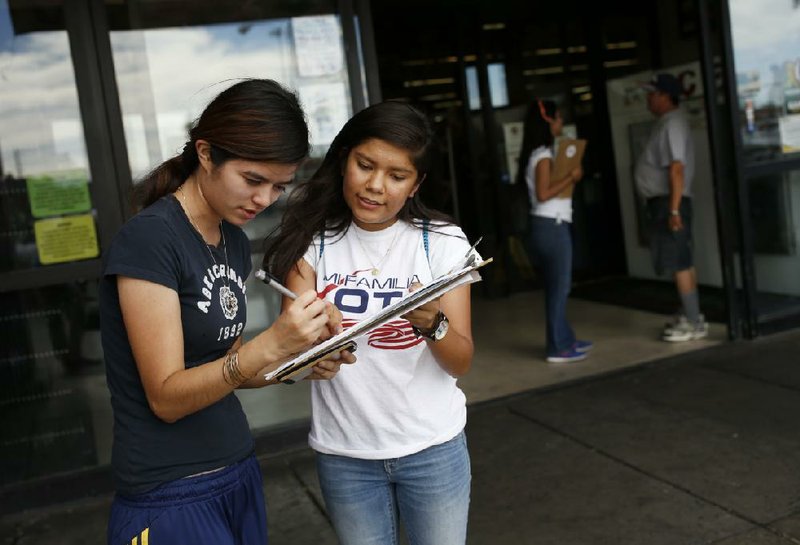LAS VEGAS -- Many Hispanic families have a personal stake in what happens on Election Day, but despite numbers that should mean political power, Hispanics often can't vote, aren't registered to vote, or sit it out.
FULL ELECTION COVERAGE
RELATED ARTICLES
http://www.arkansas…">Economy sets tone of week for 2 hopefulshttp://www.arkansas…">Optimistic Greens court Sanders followers
http://www.arkansas…">During Putin's break, Clinton found success
Enter Donald Trump, and the question that could make or break the election in key states: Has the Republican presidential nominee jolted 27.3 million eligible Hispanic voters into casting ballots?
"A lot of times you hear this rap about how politics doesn't affect their life," says Yvanna Cancela, political director of Las Vegas' largely immigrant Culinary Union. "But that changes when it's personal, and there's nothing more personal than Donald Trump talking about deporting 11 million immigrants."
Hispanics now represent the nation's largest ethnic community with some 55 million people. More than one-third of them are U.S.-born. The others are immigrants who are citizens, legal residents or here illegally. Most trace their familial roots to Mexico.
Some Republicans worry that Trump's focus on a wall along the U.S.-Mexico border -- and on forcing Mexico to pay for it -- is creating more people like John Herrera, 38, who signed up to vote in June in Las Vegas.
"I've never really voted until now, only because of Trump being against Hispanic people," he said. "I didn't think my vote would count before but now I want to make a difference."
Republicans blame a 1994 ballot measure targeting illegal immigrants in California for alienating that state's growing Hispanic population and turning it solidly Democratic.
"With Trump saying the things he's saying, we might see this same thing again," says Jody Agius Vallejo, a University of Southern California sociologist and author of Barrios to Burbs: The Making of the Mexican American Middle Class. "Only this time, it would be nationally."
There is reason to be skeptical that the Hispanic vote will make an impact.
More than half of the nation's Hispanics cannot vote because they are either under age 18 or not citizens. Relatively few of the Hispanics who are eligible to vote actually register, much less cast ballots. Their turnout rate in the 2012 was lower than that of blacks and whites.
In Texas, about 39 percent of the population is Hispanic, and 4.9 million Hispanics were eligible to vote in 2014. But less than half -- fewer than 2.3 million Texas Hispanics -- were even registered to vote, according to U.S. Census Bureau surveys.
"We've been spending our money wrong," said Crystal Zermeno, director of special projects for the Democratic field organization Texas Organizing Project. "For the past 15 to 20 years, we've been focusing on moving swing white voters. If you talk to Hispanic voters, they say, 'No one has asked me to vote.'"
Speaking on CBS' Face the Nation on Sunday morning, Sen. Jeff Flake, R-Ariz., cautioned that Hillary Clinton could win Arizona -- which has gone for the Democratic nominee only once in the past 10 presidential elections -- because of a growing Hispanic population.
"There's an increased urgency among Hispanics to vote, and if they do, it will be a changed ballgame here," Flake said. "We in Arizona realize that we've got to have meaningful immigration reform -- you can't just throw out platitudes out there about a wall and Mexico paying for it and be taken seriously here."
In Nevada, Hispanics have demonstrated the power they wield when they either turn out or stay home. In the 2014 midterms, for example, Hispanic turnout plummeted, and Republicans swept every statewide office and won control of both houses of the Legislature for the first time since 1929. But in 2008, 2010 and 2012 they helped deliver the state for Democrats.
"When you have the resources put in, you see turnout that favors the Democrats," says David Damore, a political science professor at the University of Nevada Las Vegas. "But you need to put resources in the community. It's not just going to happen."
This year -- with Trump priming the pump, and with former state Attorney General Catherine Cortez Masto running to become the first female Hispanic senator -- resources are flowing.
In June, two days after graduating from high school, Fabiola Vejar stood outside a Hispanic grocery store on a sweltering afternoon quizzing a parade of customers in Spanish: "Are you registered to vote?" Most shook their heads no. Vejar followed up: "Are you eligible?" Again, most responded in the negative. One man laughed and bellowed: "Soy Mexicano" -- Spanish for "I'm Mexican."
Vejar cannot vote. Now 18, she came from Mexico with her mother when she was 2 years old.
So she volunteers with Mi Familia Vota, encouraging others to be heard at the ballot box.
"I don't have that voice," she says, "but there's other people ... who feel the way I do. They should vote."
Xiomara Duenas will. She immigrated legally to the United States from Cuba in 1996 to join her father. She had always believed that her shaky English prevented her from becoming a citizen. She was resigned to the idea that immigrants didn't have the same rights as native-born Americans -- until Trump's candidacy.
Last November, she became a citizen. This November, she plans to act.
"I didn't want him to become president, but I couldn't do anything," Duenas said. "But now, I can vote."
Information for this article was contributed by Sergio Bustos, Will Weissert and Russell Contreras of The Associated Press; and by Abby Phillip and Sean Sullivan of The Washington Post.
A Section on 08/08/2016

